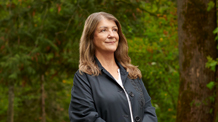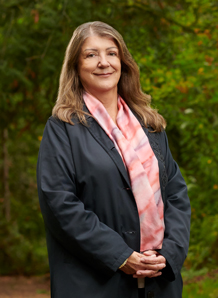WHEN DEBORAH ROSE REFLECTS ON HER NURSING CAREER, SHE’S GRATEFUL KNOWING HER UNION IS COMMITTED TO BUILDING A RESILIENT ORGANIZATION TO SUPPORT MEMBERS TODAY AND IN THE FUTURE.

The veteran nurse is no stranger to the stress and sacrifice that come with the job of caring for people in today’s health-care system. She recently participated in a series of personal resilience webinars that BCNU made available to all members this fall.
Rose works at Vancouver’s Heartwood Centre for Women. The facility’s trauma-informed care approach benefits clients who struggle with dependencies. Heartwood nurses are part of an interdisciplinary team that includes doctors, acupuncturists, counsellors, social workers, dieticians, art, music and recreational therapists and yoga instructors.
Heartwood clients come from every region of BC and are all dealing with substance use issues. Some arrive homeless, while others have been incarcerated or have violent histories. Many have been sexually abused. About 15 percent of clients are professionals, including nurses, doctors and bankers.
Rose was immediately interested when she first heard that BCNU had partnered with renowned somatic educators Anita Chari and Angelica Singh to create new personal resiliency resources for members.
“I’ve always struggled with being strong, resilient and open when I’m nursing,” she says. “I studied transcendental meditation when I was younger and appreciated the ability to maintain my inner environment when I, or someone else, was in a state of crisis.”
The mental health of nurses like Rose is more important than ever given the especially challenging demands of providing care during a global pandemic and in the midst of the ongoing opioid crisis. BCNU responded to this need by enhancing mental wellness supports for members. It started with a redeveloped resilience education program that launched in the summer of 2021.
Embodying Your Practice includes a series of practical webinars based on trauma-informed practice and equity and inclusion principles. They are designed to cultivate personal resilience and give participants effective protocols for settling their nervous systems that they can incorporate into their daily lives.
“I knew that the Embodying Your Practice approach would be a great review for me,” says Rose, “especially at a time when I’m trying to tie my whole career all together and figure out what I should be doing next.”
Rose participated in all of the introductory webinars and is now enrolled in a self-paced personal resilience course that’s designed to help participants refine the skills taught in the webinars. The course is free to all BCNU members and Rose encourages other nurses to take advantage of the opportunity to learn more about the practice of nervous system regulation by helping to build and sustain feelings of calm, even in the midst of the challenges nurses are facing today.
“As nurses, we’re very good at helping other people and listening to them, but we’re not doing enough to help ourselves,” states Rose. “The course material is very applicable and very helpful.”
“Some of the techniques taught in the course are new to me and I’ll continue to practise them and share them.”
“I’ve talked to some of my co-workers too, and I’m encouraging them to take the course because I see that more nurses are losing hope, losing energy and unable to keep up the pace.”
Embodying Your Practice is part of BCNU’s commitment to building a resilient organization. The union is now providing organizational leaders with advanced education to deepen their understanding of the new program and help all members access its resources and supports.
Rose’s own 47-year career is a testament to resilience. She graduated as a licensed practical nurse in 1974 after completing a two-year nursing program in Oakville, Ontario. The program ran concurrently with Rose’s senior high school studies, which meant she entered the workforce at the age of 18.
Her first job was at the Penetanguishene Mental Health Center.
“I look back now and think about how, as the youngest on staff, I didn’t have a lot of skills as far as resiliency goes. But I was determined to be there to help others and determined to have them teach me how they heal, help them to identify needs and guide them along.”
Rose spent four years in BC in the 1970s, working at Lions Gate Hospital and at St. Paul’s in orthopedic and cardiovascular surgery before returning to Ontario when she became homesick. Her son was born in 1988. The single mom decided to return to school rather than put her baby in childcare and in 1990 she enrolled in Canadore College in North Bay, Ontario.
“There were no bridging programs at the time, so I entered the three-year program and completely enjoyed it,” she recalls. “I was glad I made that choice, as I was getting burnt out and questioning whether to continue working as an LPN. But I realized that, after 16 years of practice, I had all of the skills and experience at that point, and it was time to expand my scope.”
Unfortunately, upon graduation Rose discovered there were no jobs for RNs and employers only wanted to hire her for LPN positions. “That was quite discouraging,” she remembers. “So, I entered into the bachelor of science in nursing program at the University of Western Ontario.”
The lack of bridging options meant Rose spent another four years in school and graduated in 1997. “All told I’ve got nine years in the classroom,” she remarks.
Degree in hand, Rose then spent several years in Windsor, Ontario expanding her practice and working in community mental health and public health.
“For seven years I was working on multi-disciplinary assertive community treatment teams to care for people with severe and persistent mental illness and making sure they were getting their needs met in their homes and in the community,” she says. “It was a really good approach to the delivery of health care – it was client-centred, and we considered all determinants when identifying clients’ needs.
“I learned a lot about nursing, about listening to clients and accommodating them instead of expecting them to come to us and having to adjust to our environment.”
Rose also taught clinical and communication courses at the University of Windsor. “The work I was doing in the classroom and in the community was really exciting and a definite period of personal and career growth for me,” she recalls.
Rose returned to BC when her mother passed away in 2009. “It was always my dream to return to the West Coast.”
She decided to accept a position at the Heartwood Centre when the program was starting up. “I’ve always liked to be involved in new approaches to the delivery of care and was able to bring the skills I had accumulated to the program.”
Rose is now Heartwood’s longest-serving staff member and works casual.
She’s reflective about her four-decade nursing journey. “My resilience and sense of autonomy certainly waxed and waned over the years,” she says.
Today, Rose is concerned about nurses’ ability to maintain control of their practice conditions.
“Last year I looked around and could see that things were deteriorating as far as being heard by management and having a sense of autonomy,” she reports. “That was frustrating considering the headway we had been making previously.”
She says the system is running on overtime and nurses are burning out. “I don’t think people appreciate the impact of that constant pressure to cover shifts. Here we are trying to stay resilient and strong and do whatever we can in the face of COVID and we’re being wiped out like it doesn’t matter.”
Rose believes nursing programs should be doing much more to address self-care. “Fostering resilience within ourselves is where it starts. In nursing school, we’re being prepared to take care of others, but when it comes to going home after a shift, that’s not quite as easy.”
She especially encourages young and new nurses to take advantage of BCNU’s resilience education and says it’s an investment that will help protect them throughout their careers.
“I see a lot of brand-new grads coming on who are not being properly mentored and just thrown into situations on their own,” Rose reports. “I’m struggling even with all my years of experience so I can only imagine the disillusion of new nurses graduating from a four-year nursing program and finding themselves short-staffed in a world of chaos that is nothing like what they’ve been taught in school.”
She believes her union will be critical for effecting the change that’s so desperately needed.
“I commend BCNU for the work it is doing to help create safe and supportive work environments – it’s making a difference and I’m very proud to still be a part of the union at this point in my career.”